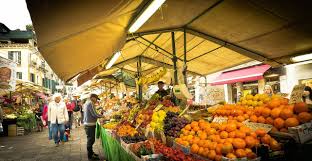Shopping in Italian food markets

Rome: One of the very best things about visiting (or living in) Italy is having the chance to visit the country’s
famously wonderful food markets. But they can be a little daunting for a first-time visitor, especially if you
don’t speak much Italian. Here’s a quick guide to what you can expect.
In some countries, shopping for your food at a farmer’s market is seen as a treat that not everyone can access
or afford. But in Italy, it’s the only way to go.
Here, the difference in price is usually small or nonexistent, and the difference in quality is enormous.
But more importantly, as an Italian flatmate once once tutted at my supermarket haul: “eating food from the
supermarket is no way to live.”
We all know about the importance of quality fresh produce to Italians, and that’s why local markets are still
enduringly popular here.
There are plenty of food markets in Italy, and choosing to shop at them gives you the chance to eat fresh,
seasonal produce, contribute to the local economy, practice your Italian, get a few recipe tips and maybe even
make some friends.
If you’re looking for the big, covered market halls you’ll find them in cities like Rome, Venice, Florence and
Turin. Elsewhere, you’ll have to find out which day the weekly market descends on the village square, or on
the outskirts of the town centre.
Both kinds of food market usually offer incredibly good value for money, and as well as doing your food
shopping you’ll be able to pick up other bits and pieces. Outdoor markets in Italy have a mixture of fresh
produce stalls, cooked food stands, and stalls selling flowers, clothing, shoes, bags, bed linen, pots and pans
and more.
Don’t be shy: This is the number one rule of visiting an Italian market. Feel free to ask questions about
everything, and ask for (or point out) exactly what you want. Many stalls will offer you a taste of their
produce, and you can also ask to try things. Sellers expect this and are usually happy to oblige.
And even the most socially awkward person will come to love small talk and chit-chat if they visit enough
Italian markets.
Don’t be surprised if market sellers start asking about your family and what you’re having for lunch. And if
you ask for cooking tips, you might just get a family recipe.
The chatting isn’t just pleasant, though. If you’re buying something, it’s almost part of the transaction –
particularly in the south, where personal connections are everything. I’ve lost count of the number of times
we’ve been given a discount or extras just because the seller found something in common with my very chatty
Italian husband.
But if you’re not a confident Italian speaker, don’t worry – a smile goes a really long way, too.
Be careful about haggling: Whether you love or hate the idea of haggling, it’s a thing here in Italy.
But as with so much else in this country, it varies from one region or town to another. Haggling is usually fine
at any market in Italy, though in the more touristy markets (such as Florence’s Central Market) it probably
won’t get you very far. While in some places, the seller will actually be disappointed if you don’t at least try!
As a very general rule, the further you are from tourist areas and the further south you go, the harder you can
bargain. Use your judgement. And If in doubt, always keep it gentle and low-key – remember you were
probably getting a bargain to start with!
Learn how to queue (or not): As you probably know, Italians have their own ideas about queuing. You might
hear someone ask “chi è l’ultimo?” (“who’s last?”) in order to find the end of the “line”, but that’s about as
orderly as things are going to get.
If it’s busy, make sure you know who was in front of you and make eye contact with the vendor to let them
know that you’re there to buy. And early in the morning, watch out for the sharp-elbowed nonnas, who treat
weaving their way to the front like a kind of competitive sport.
Time your visit: The stalls usually open from 8am and, if you’re driving, the earlier you arrive the more likely
you are to get a good parking spot.
As the morning goes on the market will get busier, making for a better atmosphere but bigger crowds.
Look but don’t touch: As at any market elsewhere in the world, don’t go around touching the produce. The
sellers will not be happy.
This one may sound obvious, but market stalls often put signs up warning non toccare (don’t touch), so
obviously someone must be doing it.
And another word of warning: as in any crowded place, stay alert and take care of your belongings.
Pickpockets don’t usually hang around markets in small towns, but in big cities this is always a risk.
And while being short-changed is rare at food markets, it is still always best to check your change.
Beware of seasonal timetables: One of the reasons it can be hard to keep track of when and where the markets
are taking place is that some will only happen at certain times of the year.
And some markets can change their hours or stop altogether in January (when it’s too cold) and July and
August (when it’s too hot.)
Check online: If you don’t have an Italian neighbour to point you in the direction of the nearest market, the
most reliable source for practical information about local markets is from your town hall (or the town hall’s
website). That’s because the city council has jurisdiction over the organisation of the markets. Happy
shopping!





